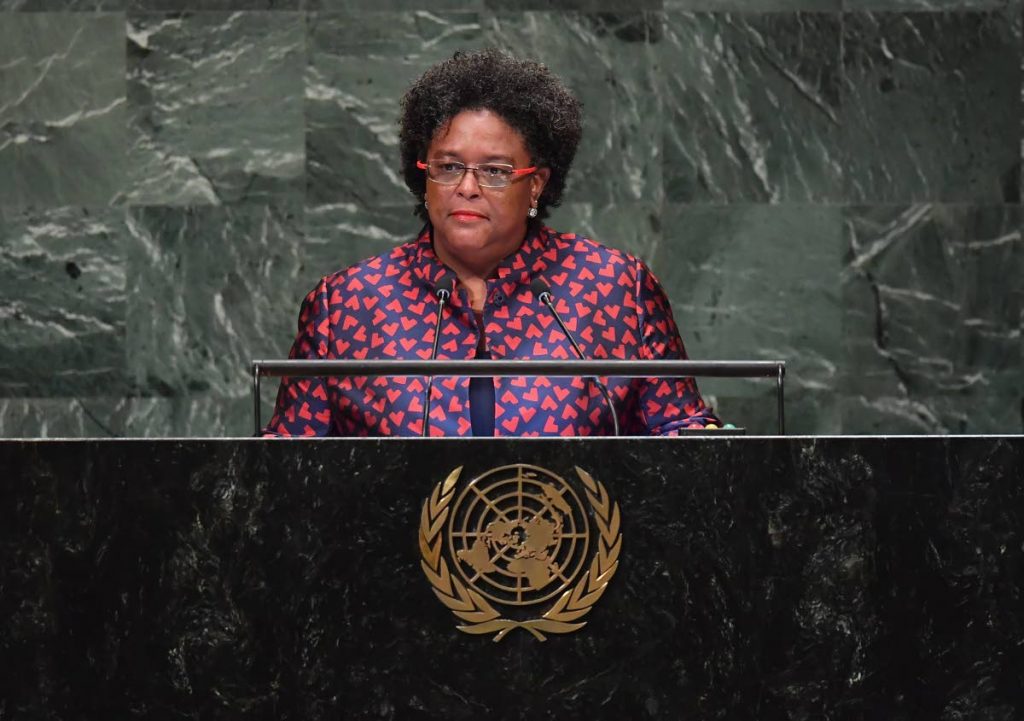C’bean leaders call for urgent policy reform

BARBADOS Prime Minister Mia Mottley stood on stage at the United Nations Climate Summit in New York yesterday to advocate not just for her own region, but every small island developing state (SIDS) at risk from climate change.
“If it were up to our community of small islands to solve the problem of climate change, it would have been solved three decades ago when we raised it. We refuse to be relegated to the footnotes of history and to be collateral damage for the greed of others,” a passionate Mottley told those gathered in the UN’s General Assembly hall.
Even as the moderator tried to cut her off and hurry her off stage for exceeding her allotted three minutes (she spoke for nearly ten), Mottley defiantly continued, saying, “I will finish soon. I really will but I am speaking on behalf of 20 per cent of the community of nations of this body.”
The two-degree rise in temperature as outlined in the Paris Agreement as the minimum to mitigate the effects of global warning needs to be taken off the table once and for all, she said. “(For us it is) 1.5 (degrees Celsius) to stay alive. Not to thrive.”
A one degree increase in temperature has already brought the world to where it is today, she said, with unacceptable and catastrophic levels of damage and loss of life. If global warming is not contained, Mottley warned, there would be mass migration by climate refugees that has the potential to destabilise the world.
She also chastised the global community for its treatment of the Caribbean, where because it is classed as middle income based on GDP, it cannot access financial aid or grants otherwise available to other developing or vulnerable countries.
“I will not avoid the elephant in the room. Under the current official development assistance rules, The Bahamas, despite its extreme vulnerability to climate change and despite the passage of Hurricane Dorian, will not have access to either grant or concessional resources as they begin the difficult task of rebuilding lives and livelihood. These rules were not developed for such a time as this and we need to change these rules that deny access to small countries, and we need to remove the bureaucracy attached.”
Barbuda and Dominica, both ravaged by Hurricanes Irma and Maria two years ago, still have not received any or all the money pledged to them.
“We must ask ourselves if small states continue to remain invisible and dispensable to the global community.”
St Lucia Prime Minister Allen Chastanet, also speaking on the plight of SIDS, endorsed Mottley’s speech. “The problems facing these states are easy to fix – all that’s needed is a pen.
“Mitigation is important, but SIDS have specific needs that need to be considered. First, the way developing countries are classified needs to consider vulnerability. Next, the SIDS need a specially dedicated fund to access for climate resilient development and a change in the governance structure of these funds. Finally, the way this debt is treated needs to be reclassified so countries aren’t overburdened economically after investing in climate resilient infrastructure.”
He also noted, as did Mottley, that even though the region has set up and contributes to the Caribbean Catastrophe Risk Insurance Facility (CCRIF), the high costs of insurance could mean that the region becomes uninsurable as regular insurance becomes unable to cover the fallout from climate change. In St Lucia, he said, the cost of insurance for small businesses is 20 per cent of operating costs – to the point where it’s economically unsustainable to have insurance.
To Mottley’s point of climate refugees, he used Dorian’s displacement for context.
“In the Bahamas 50,000 people have to be relocated temporarily for up to two years before those countries can be rebuilt. Who is going to sustain them? Where are they going to go to school? What job are they going to have? These are the practical realities we are dealing with on ground zero for SIDS. We do not have time or luxury for all the dialogue that is taking place. What would it take for a one day meeting in order that the major agencies involved just to agree on a quick solution to help us solve our problem? We are your incubator. Through our solutions, you will also help yourselves,” he said.
Also speaking at the Climate Summit was Jamaican Prime Minister Andrew Holness, whose topic was sustainable financing for developing economics. Prime Minister Dr Keith Rowley did not actively participate in the Climate Summit. Instead, he met with the UN under-secretary-general for counter terrorism Vladimir Voronkov and had a photo op with UN Secretary General Antonio Guterres. He addresses the General Assembly on Friday.


Comments
"C’bean leaders call for urgent policy reform"